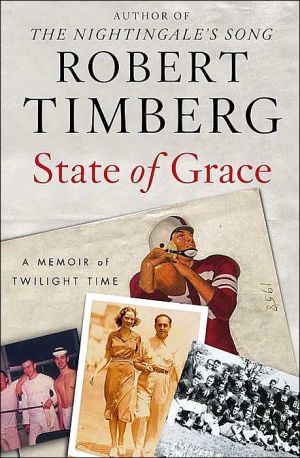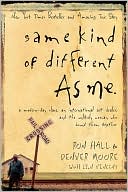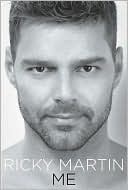State of Grace: A Memoir of Twilight Time
From the author of the critically acclaimed The Nightingale's Song ("An amazing piece of work...This is a stunning book" — Boston Globe), comes an evocative, elegiac and rollicking portrait of America.\ The Nightingale's Song was Robert Timberg's extraordinary tale of well-intentioned but ill-starred warriors. In State of Grace, his long-awaited new book, he revives the powerful themes of courage, manhood and loss in a strikingly personal exploration of America between the Good War and...
Search in google:
From the author of the critically acclaimed The Nightingale's Song ("An amazing piece of work...This is a stunning book" -- Boston Globe), comes an evocative, elegiac and rollicking portrait of America. The Nightingale's Song was Robert Timberg's extraordinary tale of well-intentioned but ill-starred warriors. In State of Grace, his long-awaited new book, he revives the powerful themes of courage, manhood and loss in a strikingly personal exploration of America between the Good War and Vietnam. "It was the twilight of innocence, or what passed for innocence if you didn't look too closely," he writes. "America was at peace, peering confidently into the future, when it should have been holding its breath for what lay ahead." Robert Timberg has his finger on the pulse of a generation that split along a fault line called Vietnam, between those who went and those who didn't. In his unflinching and riveting The Nightingale's Song, Timberg chronicled a nation haunted by the war and its corrosive aftermath. Now, in State of Grace, the author rediscovers an earlier time and an America now largely lost. Using the New York City sandlot football team he played for after high school as a rich metaphor for what was best about that bygone era, Timberg evokes the period in fine detail and vivid color. It was a world of girls, beer and the proverbial Big Game, but it also was defined by faith in tradition and institutions, including a still unsullied Catholic Church. State of Grace captures life on the threshold of Kennedy's Camelot, before the Beatles, before the Pill, but in the ever-expanding shadow of Vietnam, "a time when the path to an honorable future seemed as straightforward as playing hard, hitting clean, and not fumbling the ball." The tale is told through Timberg's own eyes as he moves from troubled youth to man, from running back on a team called the Lynvets to Naval Academy plebe to Marine officer. The story is also told through a collection of other characters, including a genius of a coach overmatched when off the field, a driven quarterback sidetracked by booze and an angry loner fresh from the army stockade who reclaims his life on the gridiron. As Timberg writes, the team was where he and his fellow Lynvets "found a toe-hold on our better selves during a troubled time in our lives. Those snatches of pride and courage and strength we shared...eventually grew within us, becoming the core of a decent manhood that might have easily eluded any one of us in other circumstances. There were times, for each of us, when it was all we had." Publishers Weekly Timberg, a Baltimore Sun writer, calls "twilight time" a special moment in America's turbulent coming-of-age, a time that found him a bewildered Queens kid, confounded by the Cold War, civil rights campaigns and the rise of the youth movement. He found refuge in playing football with a local team and befriending maverick coach Larry Kelly and a cast of motley characters. During Timberg's stint as a high school running back, he thought football embodied "the feel of war" namely passion and courage, which were "the things we prized." Timberg is at his narrative best when he juxtaposes his confusing puberty period with the bigger national picture, as when he writes, "Sinatra was about holding hands at midnight. Elvis was about getting laid." He's also a capable chronicler of his quirky parents, both show business types, and he documents their lasting influence on his and his sisters' lives. Through the years, Timberg's old football team changed with the loss of players and the coach, but Timberg, accepted as a midshipman at Annapolis Naval Academy in 1960, kept up his friendships with his former teammates. While Timberg feels nostalgic for the old neighborhoods and his cronies, he excels when he discovers a larger world. Agent, Flip Brophy. (Oct. 12) FYI: Timberg's 1996 The Nightingale's Song was a New York Times Notable book. Copyright 2004 Reed Business Information.
Introduction\ At the 69th Regiment Armory on 26th Street and Lexington Avenue, in a glass display case just off the lobby, sits a World War II infantryman's helmet. The helmet is intact except for a ragged tear on the right side, about where the temple would be. The card below explains that the helmet belonged to a Redemptorist priest killed in April 1945 while administering last rites to a soldier during the fighting on Okinawa, the final land battle of the war in the Pacific.\ The priest was raised on Eldert Lane in City Line, a working-class section of Brooklyn that bumps up against Queens just north of Jamaica Bay. A dozen years later, the priest's gallantry would be extolled in a book by Daisy Amoury called Father Cyclone. On a smaller stage, he gained recognition sooner. Less than a year after his death, the local chapter of the Catholic War Veterans renamed itself the Reverend Lawrence E. Lynch Post.\ In 1950, a group of boys from City Line barely into their teens, prodded by an unmarried appliance salesman for the Brooklyn Union Gas Company, decided to start a football team to play in a new sandlot league that had sprung up in Brooklyn and Queens. The team held its organizational meetings at the Lynch post, which occupied the second floor above a fruit-and-vegetable stand at Liberty Avenue and Eldert Lane, in the shadow of the Liberty Avenue El. At one of those early gatherings, the boys realized they needed a name for their team. They tried on a few. Crusaders and Knights were popular choices, but they were already overbooked. In fact, with the proliferation of teams, there were few good names left. Finally, someone with a better sense of place than most thought about where they were: a veterans' hall named for Father Lynch. "Let's call ourselves the Lynvets," he said. Some credit the name to Bob Lulley, the team's first quarterback, others to the baby-faced wide receiver Tommy McCabe. Whoever it was, he never suspected that he had just christened an organization that would become a living memorial to the fallen chaplain.\ The Lynvets were winners from the start. By the late 1950s and early 1960s, the years on which this book focuses, they were at the top of their game — sure of themselves, unquestioning of their values, imbued with a relentless if shortsighted optimism.\ Much like the nation itself. It was the twilight of innocence, or what passed for innocence if you didn't look too closely. America was at peace, looking confidently to the future, when it should have been holding its breath for what lay ahead.\ I played for the Lynvets after graduating from high school in 1958 and before the adult world snatched me up two years later. Though it never occurred to me then, time was running out on the Lynvets as the Fifties drew to a close. The team was balanced on a knife edge and would in a few years time tumble into a future far less hospitable to the values they embodied — and to many of the teammates who left such a lasting imprint on me.\ What I didn't sense, could never begin to contemplate, were the changes that would soon sweep the nation, making the Lynvets and the things they came to stand for in my mind — courage, toughness, unflinching patriotism, and an unremitting self-reliance — little more than loutish if exotic anachronisms to the generation that was about to reshape America.\ Change was surely on the way, though few of the Lynvets heard it coming. Ultimately, that change would be so powerful that it would transform the nation almost as dramatically as did the Civil War a century earlier. It now seems clear that the strains within American society that converged with such fury in the mid-1960s started making themselves felt a decade earlier. And as the Fifties faded, the clues were there, if your lens was ground just right.\ In February 1960, a sit-in at a lunch counter at an F. W. Woolworth store in Greensboro, North Carolina, set off a wave of similar demonstrations throughout the South as the nonviolent drive for civil rights gained fresh momentum. In May of that same year, the first birth control pill, Enovid, went on the market. In November, the youth movement, building since the advent of rock and roll early in the previous decade, surged into national politics as a telegenic Irish-Catholic senator was elected president, succeeding a World War II general two decades his senior. And in January 1961, Hibbing, Minnesota, native Robert Allen Zimmerman moved to New York and began singing his antiestablishment folk songs at Café Wha? and other Greenwich Village coffeehouses under the name Bob Dylan.\ And there was more. Over the course of the year 1961, the new president, John Kennedy, quietly made decisions that moved the nation further down the path toward a distant war. Equally as important, a generation conceived in the flush of victory by men and women who had survived the rigors of the Great Depression and the travails of World War II was closing fast on the Lynvets. By the late 1960s, the baby boomers, at least many of the more affluent and better educated among them, had rewritten the social contract in ways that few of the Lynvets would ever decipher. Along the way, they hijacked the culture, employing it to celebrate themselves, to exalt their lifestyle, and to ridicule and otherwise diminish those who weren't them and didn't want to be.\ My two years with the Lynvets, a trying and uncertain time in which off-the-field issues threatened to corrode whatever prospects I had, embedded in me values that helped define my future. Even today, looking back over a daunting expanse of years, I see that at critical moments in my life I have measured my actions against what I believed my fellow Lynvets would expect of me. My coach was an often-unemployed football genius named Larry Kelly, who I now realize was one of the most influential figures in my life. What would he think of how I handled this situation or that one? What about my teammates — Hughie Mulligan, crazy Peter Connor, Kenny Rudzewick, the great Ferriola? I feel heartened when I sense their approval, uneasy when the answer comes back, as it does all too frequently, We're not with you on this one, Bob.\ In my mind, and in the minds of my teammates, Larry Kelly and the Lynvets have long since been interchangeable. But in that summer of 1958, when I arrived on the scene from alien territory, the Kew Gardens section of Queens, the entwined legend of coach and team was just beginning to build. By then, the Lynvets were fielding teams in all four divisions of the Pop Warner Football Conference. The year before, Kelly had helped coach the Lynvet Juniors to a second straight championship. Now he had taken over the Seniors, the organization's marquee team, but an underachieving one during the previous two seasons. The players ranged in age from eighteen to twenty-one, and everyone was out of high school, one way or another. Some were married. There were a handful of guys like me going to local colleges — Hofstra, St. John's, Queens College, Fordham, Manhattan — but we were the exception. Most had already joined the workforce in a variety of jobs much like those held by their fathers — construction workers, city employees, laborers at nearby Idlewild Airport. Several worked for the Fire Department, or soon would. There were perceptible variations in educational level, economic strata, sophistication, professional promise. What we shared, and this transcended all the differences, was an unadulterated love of the game. That and a desire to be the best so fierce that it must have been tied to something deeper, more complex, perhaps the sense that our youth was slipping away and soon we would be like most of our older friends — good guys, nothing special.\ Over the next four years, the Lynvet senior team was indeed special, piling up victories at a staggering rate. Like the New York Yankees in major league baseball, the Lynvets became the team to beat in sandlot football. Opponents could dream of winning a championship, but even in their dreams they knew they would have to take down the Lynvets first. Larry Kelly was the brains of the team, the center of gravity, a great coach and a complicated man. For three of those four years, he was blessed with a gifted quarterback in Bob Ferriola — tall, elegant, a commanding presence in the huddle, his passes impossibly tight spirals that defied you to drop them. Add to Ferriola a corps of racehorse running backs led by the graceful Marine Tommy Vaughan and a sweet-natured kid named Joe Aragona who lived in Rego Park with his older sister and widowed mother. In that fourth year, because of the league's age limit, Kelly had to turn to others, among them the talented but troubled Tommy Wall and an angry kid not long removed from an Army stockade, Mike Montore. But the heart and soul of those teams were blue-collar players like Peter Connor, the Faulkner brothers, Chipper Dombo, Jackie Meyer, and Kenny Rudzewick. Rudzewick was the oddball in the group, the normal one. A bank teller during the day, a college student at night, a fiery defensive tackle in his off-hours, he would become the president of a bank and a pillar of society in the years ahead. The others led lives in varying degrees of disarray. Together, though, they played with such intensity and abandon that at times their own teammates feared being on the same field with them.\ I will recount their tales in this book, and also my own, not because any of us are particularly special but because we shared the same transforming experience with a special team, one that flew below radar in the outback of the world's most cosmopolitan city. I also hope to pay homage to a time, for me and the nation, when the path to an honorable future seemed as straightforward as playing hard, hitting clean, and not fumbling the ball.\ The Lynvets of those days were not without blemish. Heavy drinking, at team parties but not only then, would in the years ahead diminish more than a few in ways no opponent ever could. Petty thievery was rare, but not unknown. The Lynvets, after all, were educated on the same streets that schooled John Gotti and his crew of mobsters-in-waiting. Many more were stunted by limited ambitions, often arising from the near poverty of their youth, that would cripple their promise as they entered full-fledged adulthood.\ In the end, though, their transgressions were small ones. Today, as a nation unsure of its identity finds itself struggling into a new century, the virtues that the Lynvets embodied shine that much more brightly. And the years during which they ruled football on the sandlots of Queens and Brooklyn seem frozen in time — nothing less than that condition of fragile innocence between confession and the next big sin known to the faithful as a state of grace.\ Copyright © 2004 by Robert Timberg
Introduction11The Lynvets72Necessary Roughness143Living with Lenny Rochester204Father Cyclone295Think Pink356The Hoople477Switched at Birth578The Man from Mars639The Gold Dust Twins7010Can't Do Math8111Twilight Time8912Morose Delectations9913Hurricane Season10714The Coach12315"Let Me Have Steffens"13616The C-I-R Brick14517"Don't Shoot Me, I'm Only Sixteen"15318Jersey On My Mind15819Flying Tiger16820Anchors Aweigh17421The Loner18522April Is Over19123The Alumni Game20124Ring of Valor20825The Season of '6121526A Date with Judi22227Knight of the Open Road22628The Princess and the Shoes23329Crunch Time23930The Catch24631Distant Thunder25532Mount Out267Epilogue271Acknowledgments288
\ Publishers WeeklyTimberg, a Baltimore Sun writer, calls "twilight time" a special moment in America's turbulent coming-of-age, a time that found him a bewildered Queens kid, confounded by the Cold War, civil rights campaigns and the rise of the youth movement. He found refuge in playing football with a local team and befriending maverick coach Larry Kelly and a cast of motley characters. During Timberg's stint as a high school running back, he thought football embodied "the feel of war" namely passion and courage, which were "the things we prized." Timberg is at his narrative best when he juxtaposes his confusing puberty period with the bigger national picture, as when he writes, "Sinatra was about holding hands at midnight. Elvis was about getting laid." He's also a capable chronicler of his quirky parents, both show business types, and he documents their lasting influence on his and his sisters' lives. Through the years, Timberg's old football team changed with the loss of players and the coach, but Timberg, accepted as a midshipman at Annapolis Naval Academy in 1960, kept up his friendships with his former teammates. While Timberg feels nostalgic for the old neighborhoods and his cronies, he excels when he discovers a larger world. Agent, Flip Brophy. (Oct. 12) FYI: Timberg's 1996 The Nightingale's Song was a New York Times Notable book. Copyright 2004 Reed Business Information.\ \








